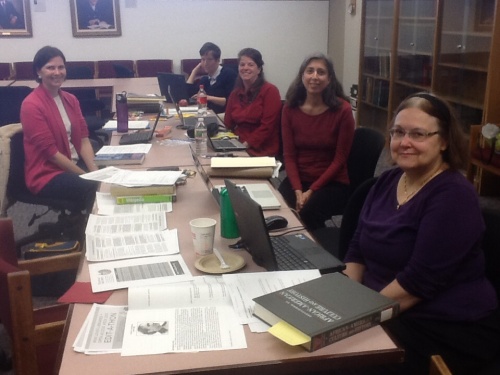Serving All Users, Great and Small
By Rick Clare, Head of Technical Services, Henry Whittemore Library
First of all, there are no “Small” users,
every user is important to the staff of the Whittemore Library.
Librarians have traditionally been identified with paper-based information, card catalogs and books for instance, as possessed by their institution. The field of librarianship is adapting to digital technologies in the production, display, storage and retrieval of information in all formats. These transitions have altered the focus of librarians, from simply “this is what we have” to “let us discover sources that will satisfy your request and then arrange for you to access them.” This has yielded the paradoxical result that librarians are increasingly able to swiftly identify highly relevant sources of information, but they are less likely to serve users with “hard copy” during that first transaction.
Remote digital information sometimes seems to be less available, involving more wait-time, than off-the-shelf volumes as in the past. Although this situation appears to make libraries and librarians less crucial to the information gathering process, it simply reflects the fact that as the galaxy of potential sources has been revealed the speed of access has not quickened apace. The impatience this situation sometimes engenders often results in yet another paradox: despite the abundance of information users inadvertently settle for lower quality information that they find for themselves immediately at hand. By analogy, as the result of waiting and being dissatisfied with repairs at automobile dealerships users have now elected to repair their own vehicles using tools and parts they create for themselves.
This is in fact the “Golden Age of Information” – we can identify and access information more accurately and comprehensively than ever before; we inadvertently run the risk of tarnishing our results when we expect or demand instantaneous delivery. This golden age of information, conducted at the speed of light, rewards planning and patience as never before. Making a pass through the internet with Google, or like search engines, is the equivalent of trawling for fish using a net with an unknown number of variously sized holes and choosing to be satisfied with the results brought to the surface. Not all of the world’s valuable information is or ever will be contained within the internet.
As the universe of information continues to become more expansive, variegated, unregulated or unreviewed, the value of professional expertise in searching and selecting current, high-quality information quietly escalates, off stage as it were. The analogy of librarians to automobile mechanics rings true in that professionals in both of these fields rarely design or manufacture the products they are called to support or enhance. They function as practical engineers, servicing demanding customers and their customized vehicles who expect error-free results, regardless of the timeframe, availability of parts or prevailing circumstances, at the lowest possible cost, although error and cost-free, instantaneous results would be even more welcome.
As an idealized interface or intermediary, librarians frequently ask users questions about their queries, not to prejudge or pry into the user or the use to be made of the search results, but to enhance the accuracy of the retrieval and bringing the need for further search refinement or a complementary search to light. Searches such as “Uses of Aspirin” and “Contraindications or Adverse Effects of Aspirin” will yield different and divergent results, some of which will bear upon the question of “Should I use aspirin now?” (to treat this or that ailment or injury).
Putting aside unanswerable, factual questions such as “What caused Beethoven’s deafness?” if the information might be put into more complete perspective by an opinion from an “expert” librarians are familiar with the concepts of “the invisible college” and “gatekeepers” and routinely employ the webs of human interaction and access to find influential and informed opinions. Over the objection of Disraeli, more and more of our world is bounded and directed by statistics. Frequently the most objective, or least distorted, statistics are gathered by government agencies. Making sense of government publications, among the most prodigious sources in the world, and confidently plucking appropriate needles from the haystacks of such publications are professional subspecialties of librarianship.
All of which is to say: information does not come into being, nor it is necessarily labeled, packaged, or retrieved in entirely unambiguous baskets, defined by any universally accepted set of standards. Even so, the answers to all questions are not matters of opinion. The challenge of research at virtually any level is to ask the questions as precisely as possible, keeping watch for exceptions and anomalies, and to draw sensible interpretations and theories from the results. If humanity possessed the clarity for unerring introspection and for the flawless recognition of reality many of our professions would not exist. Specialization, while an undoubted aid to the subtleties of the process, is best leavened by experience and judgment. As often as not, explorers are misled by their discoveries, subsequent fieldwork puts their findings into perspective. There is no weakness or defeat in improving the quality of information users may unearth by soliciting the assistance of librarians; the interpretation and exposition of findings remains the nuanced responsibility of every user. Our profession is impartially dedicated to serving users; our departmentalization is but an organizational convenience for the conduct of our own business. Collectively, library departments assist each other and the array of users, great and small.




